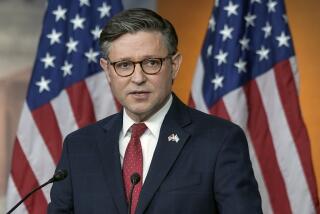Clinton Calls Upon Voters for Help
- Share via
WASHINGTON — Lamenting the failure of Congress to enact campaign-spending limits before its July 4 break, President Clinton on Saturday appealed to Americans for help in pushing the issue when lawmakers return.
“The way we pay for elections is broken,” Clinton said in his weekly radio address. “When it comes to fixing our campaign-finance system, let’s make this summer a time not of talk but of action, not of recrimination but of results.”
Last February, in his State of the Union address, Clinton set Independence Day as a deadline for Congress to send him a campaign-finance reform bill. Lawmakers, however, adjourned Friday for the weeklong break without voting on the bipartisan reform proposal offered by Sens. John McCain (R-Ariz.) and Russell D. Feingold (D-Wis.), which Clinton has endorsed.
The McCain-Feingold bill would provide some free TV advertising time--advertising expenses are a prime reason for the soaring cost of political campaigns--as well as discounted postal and advertising rates for candidates who embrace voluntary spending limits. The bill would ban contributions by political action committees and do away with “soft money,” the largely unregulated contributions to political parties from corporations, labor unions and other big-dollar donors.
Despite an ongoing furor over the role of big money in politics, which erupted in the wake of fund-raising controversies in the 1996 election cycle, most lawmakers have shown little interest in changing the system.
Sen. Judd Gregg (R-N.H.) ignored the issue altogether during the GOP response to the president’s address. In his remarks broadcast Saturday, he instead drew attention to the House and Senate votes last week to cut taxes and to a Senate-approved measure to reform Medicare.
“This has been a positive week,” he said.
Meanwhile, lawmakers, party officials and the president himself are still on the hustings soliciting money for future campaigns. Clinton is expected to travel to Boston and New York on Monday, a trip that aides say will include fund-raising for the Democratic Party.
Nevertheless, in his radio address Clinton criticized opponents of the McCain-Feingold bill and called on voters to stop lawmakers from killing the reform proposal, as they have previous efforts.
“Needed change has been filibustered to death in every Congress for a decade,” Clinton said, noting it was stymied four times during his first term as president.
Going beyond cheerleading for voter action against escalating campaign fund-raising and spending, Clinton said he isn’t waiting for Congress to act on the measure and that he is taking steps on his own to bring about limits.
“Within my power as president, I have acted to advance key elements of reform,” he said. “And I’ll continue to do so.”
In May, the White House urged the Federal Election Commission to issue an administrative order banning soft-money contributions. Five members of Congress--led by Reps. Christopher Shays (R-Conn.) and Martin T. Meehan (D-Mass.)--had already petitioned the FEC to make a similar ruling.
Clinton said Saturday that the FEC would begin formal proceedings on the request next month.
He also announced the creation of a commission that “will help the FEC decide precisely how free broadcast time can be given to candidates as a part of the broadcasters’ public-interest obligations.” The commission is headed by Leslie Moonves, president of CBS Entertainment, and Norman Ornstein, a political scientist at the American Enterprise Institute, a Washington-based think tank.
Clinton also said he is ordering the Justice Department “to fight in the courts to uphold” local efforts to enact campaign-spending limits, such as restrictions on spending for municipal campaigns in Cincinnati and judicial elections across Ohio. Those cases are being challenged in the courts, he added.
Opponents of campaign-spending limits say the restrictions would violate the 1st Amendment’s guarantee of free speech. But Clinton said, “We believe spending limits are constitutional. If we need to, we’ll make that case to the highest court in the land.”
More to Read
Get the L.A. Times Politics newsletter
Deeply reported insights into legislation, politics and policy from Sacramento, Washington and beyond. In your inbox twice per week.
You may occasionally receive promotional content from the Los Angeles Times.









